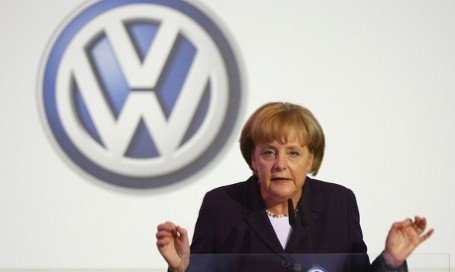VW's Deep Political Ties in Germany Seen as a Key Asset

Angela Merkel, who grew up under communism in East Germany, has said her first car after the fall of the Berlin Wall in 1989 was a VW Golf.
Mostly it's about jobs: around a third of Volkswagen's almost 600,000 positions are in Germany, and that's not to mention the company's supply chain.
For Volkswagen, however, proximity to political power is enshrined in statute.
When Germany privatized the automaker in 1960, its home state of Lower Saxony kept a blocking minority and a supervisory board seat for the region's premier.
Future presidents, chancellors and cabinet ministers have cut their political teeth in the German state with VW at their side.
That nexus of political affinity and economic awareness ensures the scandal engulfing VW is too big a threat to national prosperity for the government to be a neutral observer.
"It'll be important for the German government to look at scenarios for the worst possible outcome," Stefan Bratzel, head of auto research at the University of Applied Sciences in Bergisch Gladbach, Germany, said in an interview.
Merkel's options could include helping the state of Lower Saxony increase its stake in VW or tax incentives to promote electric cars, he said.
Not France
Merkel is thus far trying to keep VW's scandal over cheating on diesel emissions at arm's length, simply demanding that the automaker come clean quickly. Her restraint signals a reluctance by chancellery officials to exercise direct influence on private companies, according to a person familiar with government policy making who asked not to be named.
In any case, the full scope of the scandal is still not clear, the person said.
"Of course German governments take business interests into account," Marcel Fratzscher, head of the Berlin-based DIW economic institute, said by phone. Still, "if you look at France, the ties between business and politics are much closer there than in Germany," he said.
With almost 35 percent wiped off VW's share value since the affair came to light, that's a luxury that might not be granted for long if the company's position deteriorates further.
Bratzel pointed to potential parallels with General Motors, the U.S. automaker bailed out by the government during the financial crisis.
While taking greater state control -- without violating European state-aid rules -- is an option for the government, VW is in better shape than GM, and "right now I don't see the risk that Volkswagen will hit serious financial difficulties," said Bratzel. Rather, the crisis may present the government with an opportunity to move forward "more aggressively" on electric cars, he said.
Watered down
Merkel has experience intervening when it comes to autos. In 2013, she watered down European pollution-control legislation aimed at reducing CO2 emissions from cars, an action for which she was lauded by the German auto-industry lobby, the VDA.
Justifying her decision to defend jobs, Merkel said at the time there was a need "to take care that, notwithstanding the need to make progress on environmental protection, we don't weaken our own industrial base."
Cars accounted for almost 20 percent of Germany's near $1.5 trillion in exports last year, or to put it in blunt political terms: one in seven jobs.
When it comes to Volkswagen, German chancellors don't intervene in company decisions. But the unique arrangement in Lower Saxony has spawned alumni in high places with an interest in the boardroom, including Merkel's Social Democratic predecessor, Gerhard Schroeder.
Schroeder, who sat on VW's supervisory board for eight years as state premier, was known as the "auto chancellor" when he led Germany from 1998 to 2005 because of his perceived closeness to the car industry.
Following him to Berlin after serving at his side in Lower Saxony was Frank-Walter Steinmeier, now in his second stint as Merkel's foreign minister.
Sigmar Gabriel, who succeeded Schroeder as state premier -- and VW board member -- is now vice chancellor and economy minister. He also heads the Social Democratic Party, Merkel's junior coalition partner.
Christian Wulff, a Christian Democrat like Merkel who succeeded Gabriel in the state capital Hanover, made it all the way to the German presidency, before resigning in 2012 amid a legal probe. He was subsequently exonerated.
Political lobbying
Another graduate of the Schroeder days is Thomas Steg, a former head of press for the SPD in Lower Saxony whom Schroeder summoned to Berlin. Steg went on to serve as deputy government spokesman through Merkel's first term before leaving to set up his own PR company. He is now VW's chief lobbyist.
(His counterpart at Daimler, Eckart von Klaeden, joined the Stuttgart-based luxury carmaker directly from the chancellery, where he was a senior aide to Merkel.)
Merkel rarely misses public displays of support for the auto industry at car shows and has gone the extra mile for VW during her decade in power.
She fought an EU challenge against Lower Saxony's 20 percent shareholding and other restrictions, popularly known as the Volkswagen Law in Germany, before her government passed amendments in 2008.
The state's role at the company remains in its bylaws, which guarantees two supervisory board seats. After a visit to Washington in 2010, she tacked on a cross-country flight to California to inaugurate the Volkswagen Automotive Innovation Lab at Stanford University.
"I think I don't need to explain to anyone that Volkswagen is an exceptionally innovative and good brand," she said at the ceremony.


